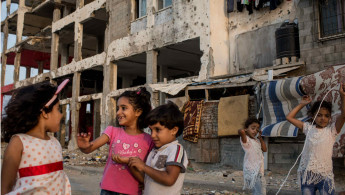UN allocates $2.5 million to tackle Gaza energy crisis
“The serious decline in living conditions in Gaza continues,” said Robert Piper, UN Coordinator for Humanitarian Aid and Development Activities for the occupied Palestinian Territory.
The distributions from the Humanitarian Fund will strengthen the UN's emergency fuel operation which at large supplies to generators to maintain operations in around 190 critical health, water and sanitation installations.
It is being hoped that all of the two million Palestinians besieged in Gaza benefit from this fuel operation.
The funding will also provide essential life-saving medical equipment and supplies, as Gaza’s health sector is experiencing deterioration.
Cash assistance, solar panels and agricultural materials that are also included to improve food security and reduce food production costs will also be provided for 2,200 small-scale farmers who irrigate by pumping from small wells.
Gaza has effectively been under siege by Israel since Hamas came to power in 2007, but has received most of its electricity and fuel from Israel ever since, subsidised by the PA.
A similar blockade from the Egyptian side of the border has exasperated the problems for Gazans, with energy, food, fuel, medical supplies and building materials in short supply.
In April, the PA began to end energy payments, causing frequent power cuts in Gaza and severe pressure on regional hospitals.
The World Health Organisation warned in June that the blackouts threatened Gaza's health service provision and placed people's lives at real risk.
In order to reverse this trend however, Abbas said he was ready to resume payments in exchange for a power-sharing deal from Hamas.
Hamas published a rewrite of its charter in May, with a reconciliatory nod towards the PA – the first step towards reconciliation.
"Hamas emphasises the need to build Palestinian institutions and national platform on solid and correct democratic bases," the new charter reads.





 Follow the Middle East's top stories in English at The New Arab on Google News
Follow the Middle East's top stories in English at The New Arab on Google News
![The UAE is widely suspected of arming the RSF militia [Getty]](/sites/default/files/styles/image_330x185/public/2024-11/GettyImages-472529908.jpg?h=69f2b9d0&itok=Yauw3YTG)
![Netanyahu furiously denounced the ICC [Getty]](/sites/default/files/styles/image_330x185/public/2024-11/GettyImages-2169352575.jpg?h=199d8c1f&itok=-vRiruf5)
![Both Hamas and the Palestinian Authority welcomed the ICC arrest warrants [Getty]](/sites/default/files/styles/image_330x185/public/2024-11/GettyImages-2178351173.jpg?h=199d8c1f&itok=TV858iVg)